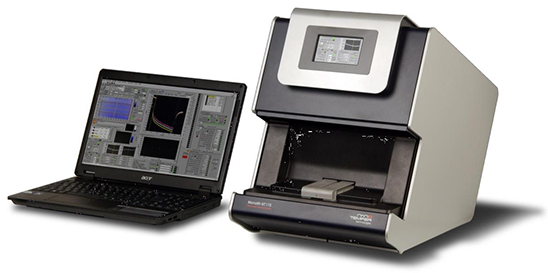Microscale Thermophoresis (MST)
Lab Staff: Dr. Chiara Marabelli
MST Description
The Microscale Thermophoresis Technology (MST) takes advantage of the various changes that occur in the properties of a biomolecule of interest e.g. size, charge, hydration shell etc. that occur when exposed to a temperature gradient induced by an infrared laser. The directed movement of molecules through this gradient is detected and quantified using covalently attached fluorophores. MST measurements can be recorded in close-to-native conditions: immobilisation-free and in a biological liquid of choice (i.e. purified protein samples, serum, cell lysates).
The technology uses fluorescence, combined with IR-Laser optics for local heating of the sample. The heating laser is focused through the same objective used for fluorescence detection. This allows a precise local heating (typical 1-6 K) of the sample within the capillary, and simultaneously, an observation of local changes of fluorescence intensity due to the motion of labeled molecules in the glass capillaries. Fluorescently-labelled molecules or particles are initially distributed evenly and diffuse freely in solution. By switching on the IR-Laser, the molecules experience a thermophoretic force in the temperature gradient and typically move away from the heated spot. At steady state, this molecule flow is counterbalanced by ordinary mass diffusion. After turning off the laser, the particles diffuse back to obtain a homogeneous distribution. The following stages are recorded for each sample: fluorescence signal before turning the IR laser on, fast temperature-dependent changes in fluorescence intensity, thermophoresis and back diffusion after switching the laser off.
Services
We offer a departmental service, available to internal and external users, to measure any type of biomolecular interaction (from ions to ribosomes) using state-of-the-art MicroScale Thermophoresis (MST) technology in a dynamic range from 1 pM to mM1. MST takes advantage of the various changes that occur in the properties of a biomolecule of interest e.g. size, charge, hydration shell etc. that occur when exposed to a temperature gradient induced by an infrared laser. The directed movement of molecules through this gradient is detected and quantified using covalently attached fluorophores. We offer assistance in sample labelling and experimental measurements using our in-house Monolith NT.115 Series Instrument (http://www.nanotemper-technologies.com/products/monolith-series/monolith-nt115-series/)
MST is useful for basic research and pharmaceutical research applications including small molecule profiling, which are difficult to access with established technologies as they require high sensitivity.
The MST service is managed by technician Dr. Chiara Marabelli.

The Structural Biology Group comprises members from both the DBS-UNIMI and the IBF-CNR. The content herein is not regulated by the University of Milan.



